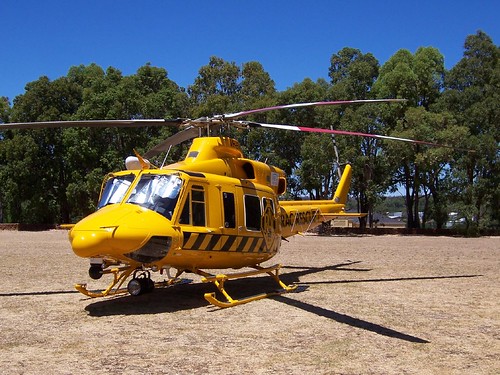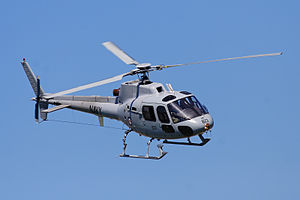 |
| If you can't find me, start looking here: Lawar Beach |
"Doc, where are you? The chopper went down."
"What? Are you serious? Can you say that again?"
"The chopper went down in the jungle. That's all we know right now. You better come in."
"Shit. Okay, I'm on the way."
I heard him the first time. Like most people who can't believe what they hear, I had to hear it again.
 |
| Bell 412 |
I grabbed my things off the beach and headed to my car. From the smell of it, I was missing an amazing Sunday barbecue. Barbecue genes run deep in Aussies, New Zealanders and South African DNA. I hadn't eaten since breakfast. I was starving.
I headed out on the beach access road in my old, hospital issue Toyota SUV. The Lawar Beach road was cut through the jungle and was barely wide enough to keep the side-view mirrors from scraping against the brush, vines and trees. The path was was relatively flat, but full of random pot holes, gravel and dips that made the Toyota bottom out each time with a loud thunk. If this were the raining season the holes would have been twice this size and I would have been screwed. Next year I'm going to ask for a truck. I called our paramedics back at the Jungle Clinic to see if they'd heard anything. There was no more information. The chopper was down in the jungle and two people were known to be onboard. Soon I made the turn onto the paved jungle road. This road had more organized and predictable potholes. When I reached the main gate there was a security check point. A group of company guards in red uniforms and armed Indonesian soldiers stood in front of the gate. There was recently a violent demonstration outside the gate and the guards and soldiers were a little bit twitchy. I stopped and politely let the guards know that there was an emergency. They lifted the iron gate and let me past without the usual security check.
When I got to the hospital our paramedics were checking and rechecking the blue backpacks full of medicines, splints, wraps and emergency supplies. The entire staff had been called in this Sunday and were in remarkably better spirits about it than I was. Still no further information. The company's second helicopter, a Eurocopter AS350 "Squirrel", had been scrambled and was on the way for the search and rescue. I watched it land in the soccer field across the clinic when I pulled in. I ran over with the paramedics and spoke to the pilot.
 |
| If you are seeing this view, you might be on a stretcher in my helicopter |
The two young paramedics packed the rescue equipment into the storage space in the back of the Squirrel. The blades were turning and I had to shout to hear my own voice as I prepped them on what they needed to do. They both had a look somewhere between ambition, fear and bewilderment as they climbed into the chopper. Neither was over twenty-four years old. I then made a quick executive decision and pulled the younger of the two paramedics off the helicopter. I took his place in the front seat of the Squirrel. IF we were able to find the Bell 412 in the jungle and IF we were able to get to it, it was not going to be pretty. There could be some tough decisions to be made and some harsh visuals to face. I felt like I was the best guy here to deal with them. There's not usually many survivors after a helicopter crash and these guys had never seen a dead body. This shouldn't be the first time they do.
Unfortunately, in nearly thirty years of doctoring I've seen more dead bodies than I can remember. But I'll never forgot the first one I saw: I was twenty-four years old, but at the time it seemed so much older than these kids who work for me today. It was three AM and I was a medical student in a hospital in Philadelphia that has long since been knocked down and forgotten. There was a 30 year old woman in the ICU that 5 doctors and nurses were frantically trying to resuscitate. By the time I got there it was just at the end of the Code Blue call. I was asked to puncture her femoral artery to see if she still had any oxygen in her blood. Her skin was cold, clammy and un-alive. She was a Hispanic woman, unnaturally pale and I remember that she had a long braided ponytail hanging off the bed. I don't know why she was in the ICU or what had killed her, but it was as definitive a moment as any I've ever experienced. It changed me and I still see it in my mind like it was yesterday. I suppose a glimpse of death and pain it is a rite of medical passage for any young paramedic working in this remote and hazardous place. But for some reason, like an overprotective father, I badly wanted to spare them this visual today.
 |
| The trusted Squirrel |
About five minutes into the flight we reached the beautiful Sumbawa coastline. It was a mix of white sand, rocky cliffs and long rolling ocean waves that has made the most hardcore surfers drool uncontrollably. On any other day this would have been a dream flight of a privileged few. Then something came to mind. Three months ago, while I was still living in Thailand, a Bell 212 helicopter crashed near the Myanmar border for no apparent reason. Three days later, a second chopper crashed while going to retrieve the bodies from the first crash. The cause: no apparent reason. One week later, a third chopper-another Bell 212-went down while going after the wreckage of the first two. Then, out of nowhere, a panic attack.
 |
| Nice view, but a bad place for a panic attack |
When I was finally back in my own skin, I talked to the pilot about our options for getting to the chopper if we found it. The Squirrel had no mechanical winch so if we needed to get through the jungle top it was going to be down and up by rope-not the greatest of options. We would have to be lowered through the ceiling of the trees to the jungle floor below. It was at this point when I realized I was still in my shorts, tee shirt and sandals--hardly standard jungle protective gear. I was however, still wearing my badge and was wearing SPF 50 sunscreen from the beach. I nonchalantly scanned the feet of the other rescue workers for compatible sized boots to purloin if it came to it. Jumping quickly into the rescue chopper still felt like the right thing to do at short notice, but in retrospect was not a greatly thought out plan. There was no time for that.
 |
| A beautiful view unless you are trying to find something here. |
I'd brought my Iphone with me to maintain contact with the clinic and with rescue management. I used it to photograph the areas we suspected might be close to the crash site including the few, small recognizable landmarks that could be identified in this sea of trees below us. We stopped, refueled quickly and made one last sweep stretching the daylight as long as possible before we were forced to put down at sunset. We'd have to start again tomorrow at first light. I was exasperated, sweaty and disappointed. I walked back to the clinic and noticed I still had sand on my legs from Lawar Beach. The beach seemed like four days ago, not four hours. I wanted to go home, put some food in my belly, have a beer and let the rest of the night pass freely from a solid position on my couch. That wasn't going to happen. I got a call to come immediately to the management office for a debriefing of our search.
 |
| Smoke, but no chopper |
A giant satellite Google map was up on a large screen in the front of the war-room. I showed them the area we'd searched for the last 3 hours and used the photos from my Iphone to narrow the possible search region. The plan was for the Squirrel to put down at first light in a clearing as close as possible to the likely crash area . The rescue workers would go in by foot. I would not be going with them. I had normal clinic duties the next day and in reality this was no longer a rescue mission. It was a retrieval. Our young paramedics would join the rescue team tomorrow. Despite my best efforts, they would not be spared a horrific first view of a dead body.
I tried.
 |
| I dislike helicopters. Does it show? |
Unfortunately mate, if you don't want people to see a body, you're in the wrong game - both medicine and mining. From memory I saw my first body on Sumbawa. Things like that stick with you. Shane
ReplyDeleteAnother episo of M.A.S.H.but in a different time.
ReplyDeleteSuong
Horrific--- saving lives and treating the ill are always a challenge, esp. in those conditions. My 25 plus yrs in nursing has shown me many conditions:saddness and joy. Many blessings to you AND all that give of themselves. I pray for PEACE and justice everyday
ReplyDeleteMore, please.
ReplyDeleteYou have me hanging.... I think I'll just leave it at that.
ReplyDeleteCarol
Reservist is very proud of you
ReplyDeleteOK, Erik, I didn't expect a happily-ever-after conclusion, but I did want SOME conclusion. You're an expert tease!
ReplyDelete